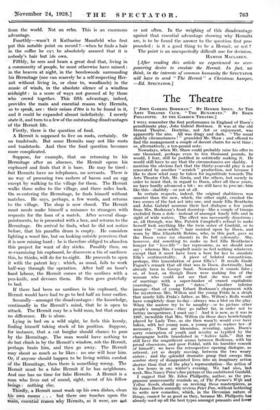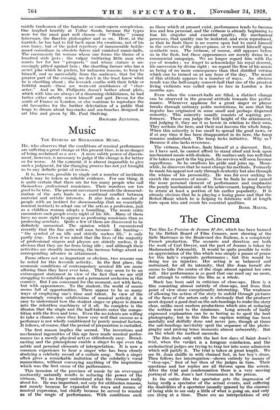The Theatre f" JOHN GABRIEL BOHEMIAN." BY RENRIEC IBSEN. AT
THE "ARTS --THEATRE CLUB: " THE RUNAWAYS:" By EDEN PHILLPOTTS. AT THE GARRICK- THEATREA I WELL remember the first performance in England of Ibsen's penultimate play, John Gabriel Borkman. It was at the old Strand Theatre. Doctrine, not Art or enjoyment, was apparently the aim. All was dingy. and dark. The usual shabby circumstances ! " grumbled Mr. Shaw ; and offered to find the management a couple of decent chairs for next time ;
or, alternatively, a ten-pound note. -
Nowadays, when Mr. Shaw could probably raise his offer to one thousand, perhaps even to ten thousand pounds, he would, I fear, still be justified in satirically making it. He would still have to say that the circumstances are shabby. I mention the obvious fact that the thirty-year-old play is not renovated by another " scratch " production, not because I like to show what may be taken for ingratitude towards The Arts Theatre Club, Mr. Grein, and the others, but merely in order to insist that, in regard to Ibsen, after all these years, we have hardly advanced a bit : we still have to pro Tug? him like this—shabbily--or not at all.
In certain respects, indeed, the original shabbiness was smarter than the new, which, the other night, crushed the two scenes of the last act into one, and made Ella Rentheim and John Gabriel murmur their last dialogue a few yards from Mrs. Borkman's front doorstep—like a couple of tramps excluded from a dole—instead of amongst lonely hills and in sight of wide waters. The effect was necessarily disastrous ; as, all through, was Mrs. Patrick Campbell's refusal to make herself look anything like the twin sister of Gunhild, or to wear the " snow-white " hair insisted upon by Ibsen, and worn by Miss Elizabeth Robins, who, in this part, gave us the Ibsen voice (or chaunt) in its full solemnity. She, however, did something to make us feel Ella Rentheim's hunger for " love-life "—her repressions, as we should now say ; whereas Mrs. Campbell made us feel nothing whatever, except that it must have been a bore for her to simulate Ella's sentimentality. A piece of belated romanticism, perhaps, this lamentation of poor Ella's ! It recalls Emile Faguet's remark that all that was in Ibsen, doctrinally, had already been in George Sand. Nowadays it sounds false ; or, at least, as though Ibsen were making fun of the woman who could not see that she was well out of marriage with a super-banker of crazed capitalistic yearnings. This part " dates." Another inferior passage—that of young Erhart Borkman's elopement with the mysterious Mrs. Wilton and the young Frida in a sleigh that nearly kills Frida's father, as Mrs. Wilton's Rolls would have completely done to-day—always was a blot on the play. When the austere try to be naughty—or to picture other people's naughtiness—they go rather far, in order not to betray inexperience, I must say ! And it is now, as it was in 1897, incredible that Mrs. Wilton (in those days bewitchingly played by Lady Tree, as she then wasn't) would ever have taken, with her young man, a young girl to replace her—if necessary. These are blemishes, revealing, again. Ibsen's sorry conception of youth and revelry as typified by the champagne bottle brandished in " festive halls." But we still have the magnificent scenes between Borkman, with his proud obsessions, and poor Foldal, with his humbler conceit of himself ; we have the retrospective opening dialogue, so reticent, yet, so deeply moving, between the two weary sisters ; and the splendid dramatic grasp that sweeps this sombre story of disappointed lives into an imaginary action shorter than that of the play's representation—the action of a few hours in one winter's evening. We had also, last week, Miss Nancy Price's fine picture of the embittered Gimhild. I suggest that Mr. Eden PhWpotts, author, as the pro- gramme unnecessarily reminds us, of. The Farmer's Wife and Yellow Sands, should go on reviving those masterpieces, as Sir James Barrie annually revives Peter Pan; without bothering to write new comedies, which, in the Devonian nature of things, cannot be as good as they, because Mr. Phillpotts has already used up all the best types amongst peasants and lower middle tradesmen of the fantastic or comic-opera complexion. One laughed heartily at Yellow Sands, because the types were for the most part well chosen—the " Bolshy " young fisherman, the Bacchic philosopher and so on. Here, at the Garrick, he has had to fall back upon the creations, not of his own fancy, but of the jaded repertory of innumerable bottle- nosed comedians in obsolete farces and vanished music-halls. The enormously fat woman whose size forms the theme of a hundred stale jests ; the vulgar twittering little man who courts her for her " prospects " and whose stature is un- ceasingly pitted against hers ; the chortling farmer who has a secret joke which he prefers, for unknown reasons, to•keep to himself, and so successfully from the audience, that for the greater part of the evening, we don't in the least know what he is chortling about ; the lovesick youths with their fickle or faithful maids—these are worn-out semblances of " char- acter." And as Mr. Phillpotts doesn't bother about plots, which with him are always of a disarming childishness, he had better either utterly renew himself and quit Devon for the south of France or London, or else continue to reproduce the old favourites for the further delectation of a public that longs to dream about haystacks and sea-beaches designed in art blue and green by Mr. Paul Shelving.
RICHARD JENNIIsIGS.



















































 Previous page
Previous page